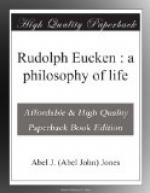Eucken is never more brilliant than he is in the examination he makes of the historical forms of religion, for the purpose of formulating the Absolute and final form; some account of this must be given in the next chapter.
CHAPTER VIII
RELIGION: HISTORICAL AND ABSOLUTE
In examining the various historical forms of religion, Eucken, as we should expect, is governed by the conclusions he has arrived at concerning the solution of the great problem of life, and especially of the place of religion in life.
A religion which emphasised the need for a break with the world, and of fight and action for spiritual progress, the possibility of a new higher life of freedom and of personality, and the superiority of the spiritual over the material, and which presented God as the ultimate spiritual life, in which the human personality found its real self, would thus meet with highest favour, while a form of religion that failed to do so would necessarily fail to satisfy the tests that he would apply.
He does not spend time discussing various religions in detail, but deals with them briefly in general, in order to show that the Christian religion is far superior to all other religions, then he makes a critical and very able examination of the Christian position. He considers it necessary to discuss in detail only that form of religion that is undoubtedly the highest.
The historical religions he finds to be of two types—religions of law and religions of redemption. The religions of law portray God as a being outside the world, and distinct from man, One who rules the world by law, and who decrees that man shall obey certain laws of conduct that He lays down. Failure to obey these laws brings its punishment in the present or in a future life, while implicit obedience brings the highest rewards. To such a God is often attributed all the weaknesses of the human being, sometimes in a much exaggerated form—hence His reign becomes one of fear to His subjects.
A religion of law assumes that man is capable of himself of obeying the law, and is responsible for his mode of life; it assumes that man is capable through his own energy of conquering the world of sin, and of leading the higher life.
Religions of this type possess of course the merit of simplicity, transparency, and finality. The decrees, the punishments and rewards are given with some clearness and are easily understood; there is no appeal and little equivocation. They served a useful purpose in the earlier ages of civilisation, but cannot solve the problem for the complex civilisation and advanced culture of the present age. They place God too far from man, and attribute to man powers which he cannot of himself possess. The conceptions of the Deity involved in them are too anthropomorphic in character—too much coloured by human frailties.
The religions of law have had to give place to those of a superior type—the religions of redemption. These religions appreciate the difficulty there exists for humankind of itself to transcend the world of sin, and are of two types—one type expressing a merely negative element, the other a negative and positive element.




